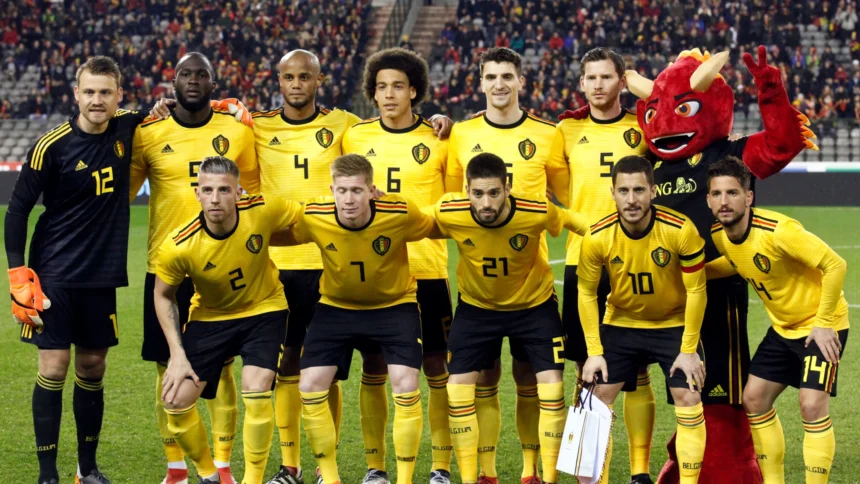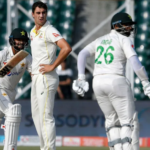Introduction to Belgium’s Football History
Belgium, a nation known for its exquisite chocolate and picturesque landscapes, has recently emerged as a formidable force in the world of football. With their golden generation of players taking center stage on the global platform, Belgium’s rise as a football powerhouse has been nothing short of extraordinary. From humble beginnings to reaching the pinnacle of international success, this small European country has captured the hearts and minds of fans worldwide with their dazzling performances in the FIFA World Cup. In this blog post, we will delve into Belgium’s football history, analyze their tactics and style of play, examine key players who have shaped their journey so far, and explore the factors that have contributed to their success on the grandest stage of them all. So, grab your favorite jersey and join us on this thrilling ride through Belgium’s remarkable rise at the FIFA World Cup!
The Evolution of Belgian Football and its Impact on the National Team
Belgium’s journey in the world of football has been nothing short of remarkable. Over the years, the country has experienced a significant evolution in its footballing culture, which has ultimately shaped the national team into a formidable force on the international stage.
The transformation began with a shift in focus towards developing young talents and improving infrastructure at grassroots levels. Belgian clubs started investing heavily in their youth academies, nurturing promising players from an early age. This emphasis on player development translated into success for the national team as these talented youngsters gradually made their way into the senior squad.
Moreover, Belgium’s domestic league underwent a renaissance during this period. The introduction of foreign investment and top-quality coaching led to increased competition and improved standards within Belgian football. As a result, homegrown players were exposed to more challenging environments week in and week out, honing their skills against some of Europe’s finest.
Another crucial factor behind Belgium’s rise is their tactical adaptability. The national team adopted an attractive style that focused on possession-based play while also valuing quick transitions and lethal counterattacks. This flexibility allowed them to exploit weaknesses in opponents’ defenses successfully.
Furthermore, Belgium boasts an abundance of exceptional individual talent who have showcased their abilities at elite European clubs. Players like Eden Hazard, Kevin De Bruyne, Romelu Lukaku have consistently performed at high levels for both club and country.
The impact of this evolution was evident in recent FIFA World Cups where Belgium achieved impressive results. In 2014 they reached the quarterfinals before finishing third overall – their best ever performance at that time. Four years later, they went even further by reaching the semi-finals; narrowly missing out on a place in the final after losing to eventual champions France.
Looking ahead, challenges lie ahead for Belgium as expectations continue to grow exponentially with each tournament, they participate in. Maintaining consistency will be vital while addressing any weaknesses or vulnerabilities that may arise during competitive campaigns.
Key Players in the
Belgium’s rise as a football powerhouse can be attributed to the stellar performances of their key players. These individuals have not only demonstrated exceptional skills but also brought a sense of unity and determination to the team.
One such player is Eden Hazard, the captain and talismanic figure for Belgium. Known for his dribbling ability, vision, and goal-scoring prowess, Hazard has been instrumental in leading his team to victory. His leadership qualities combined with his technical brilliance make him a vital cog in Belgium’s attacking machinery.
Another standout player is Kevin De Bruyne, who acts as the engine room of the Belgian midfield. With his precise passing and incredible work rate, De Bruyne has become an indispensable asset for the national team. His ability to control the tempo of games and create scoring opportunities is unparalleled.
In defense, Jan Vertonghen and Toby Alderweireld form a formidable partnership at center-back. Their defensive solidity, composure on the ball, and aerial dominance provide a solid foundation for Belgium’s backline.
Upfront, Romelu Lukaku has emerged as one of Europe’s most lethal strikers. Blessed with immense strength and pace, Lukaku poses a constant threat to opposing defenses. His clinical finishing ability has proven crucial in unlocking tight matches.
These key players exemplify Belgium’s golden generation – a group that combines individual talent with collective chemistry seamlessly. Together they form an unbeatable force that makes Belgium one of the top contenders at every FIFA World Cup tournament they participate in.
Belgium’s Performance in Recent FIFA World Cups
Belgium’s Performance in Recent FIFA World Cups has been nothing short of impressive. The Red Devils have emerged as a formidable force, making their mark on the international stage. In the 2014 edition held in Brazil, Belgium reached the quarterfinals, showcasing their talent and potential to the world.
Led by their Golden Generation of players, Belgium continued to shine in the subsequent tournaments. In 2018, they surpassed all expectations and achieved their best-ever finish at a World Cup by securing third place. This remarkable achievement was a testament to Belgium’s growing stature as a football powerhouse.
One key factor that contributed to Belgium’s success in recent FIFA World Cups is their strong tactical approach and cohesive style of play. Under the guidance of skillful manager Roberto Martinez, they displayed an attacking brand of football that thrilled fans around the globe.
The team’s ability to seamlessly transition from defense to attack with pace and precision has been instrumental in breaking down opponents’ defenses. With players like Eden Hazard, Kevin De Bruyne, and Romelu Lukaku leading the charge upfront, Belgium possesses immense firepower that can dismantle any defense.
Furthermore, Belgium boasts exceptional depth within its squad – a crucial asset for navigating through grueling tournament schedules. The presence of talented substitutes who can seamlessly integrate into gameplay ensures continuity even when key players are fatigued or injured.
However, despite this string of successful campaigns at major tournaments, challenges loom for Belgian football. As opposing teams become more familiar with their tactics and style of play, devising effective strategies against them becomes increasingly important.
Moreover, sustaining high levels of performance over multiple competitions poses its own set of challenges. Maintaining motivation and hunger among players can be difficult after achieving significant milestones like reaching semifinals or winning individual awards such as Golden Boots or Gloves.
Looking ahead towards future editions of FIFA World Cup competitions presents both excitement and uncertainty for Belgian Football fans worldwide.
Analyzing Belgium’s Tactics and Style of Play
Belgium’s tactics and style of play have been crucial in their rise as a football powerhouse in the FIFA World Cup. The team has adopted an attacking approach, focusing on possession-based football and quick, incisive passing.
One key aspect of Belgium’s tactics is their emphasis on building from the back. The defenders are comfortable on the ball and often initiate attacks with precise passes to midfielders or wingers. This allows them to control the tempo of the game and create opportunities for their forwards.
In terms of formation, Belgium typically deploys a 3-4-3 or 3-5-2 system. This provides balance between defensive solidity and offensive firepower. The wingbacks play a vital role in this setup, providing width and overlapping runs to stretch opposition defenses.
Belgium’s style of play also revolves around their talented individuals who excel in both technical ability and physical prowess. Players like Eden Hazard, Kevin De Bruyne, and Romelu Lukaku bring flair, creativity, and clinical finishing to the Belgian attack.
Moreover, Belgium’s tactical flexibility enables them to adapt to different opponents’ strategies during matches. They can switch seamlessly between possession-based play or launching quick counterattacks depending on the situation.
Belgium’s tactics focus on aggressive attacking football while maintaining defensive stability through disciplined positioning and high pressuring. Their style of play has proven effective against top teams in recent World Cups as they continue to make deep runs into tournaments.
Factors Contributing to Belgium’s Success in the 2018 FIFA World Cup
Belgium’s success in the 2018 FIFA World Cup can be attributed to various factors that came together perfectly. One key factor was the exceptional talent and skill of their players, who formed a cohesive and united team. The Golden Generation of Belgian football, comprising stars like Eden Hazard, Kevin De Bruyne, and Romelu Lukaku, played a vital role in driving the team forward.
Another contributing factor was the tactical acumen displayed by Belgium’s coach Roberto Martinez. He devised innovative strategies that capitalized on the strengths of his players while exploiting weaknesses in opposing teams. This flexibility allowed Belgium to adapt their game plan as needed throughout the tournament.
The mental strength and determination exhibited by the Belgian players also played a significant role in their success. They showed resilience even when facing tough opponents or trailing behind in matches. Their never-give-up attitude propelled them to stage comebacks against teams like Japan and Brazil.
Furthermore, Belgium’s strong emphasis on youth development cannot be overlooked. The country has invested heavily in nurturing young talents through its academy system, which focuses on technical skills and comprehensive player development from an early age. This long-term investment paid off handsomely as many youngsters seamlessly integrated into the senior squad during crucial moments.
Additionally, unity within the team was evident both on and off the field. The players displayed excellent camaraderie and teamwork throughout their campaign at Russia 2018. This cohesive spirit fostered trust among teammates and created a positive environment conducive to success.
Lastly but certainly not lastly (if that is even a word), fan support also contributed significantly to Belgium’s accomplishments in 2018. The Red Devils had passionate supporters cheering them on every step of their journey – whether it be at home or away games – creating an electric atmosphere that motivated players further.
Challenges Faced by the Belgian National Team and Future Outlook
As Belgium continues to establish itself as a football powerhouse, it is not immune to challenges. One of the main obstacles faced by the national team is their lack of international success in major tournaments prior to recent years. Despite having a rich footballing history, Belgium struggled to make an impact on the global stage for many decades.
Another challenge that Belgium faces is maintaining consistency in performance. While they have shown remarkable progress in recent World Cups, there have been instances where they fell short of expectations. The pressure to deliver consistently high-level performances can be daunting for any team, and Belgium is no exception.
In addition, injuries can also pose a significant challenge for the Belgian national team. As with any sport, injuries are inevitable and can disrupt the flow of a tournament campaign. It becomes crucial for Belgium’s coaching staff to manage these setbacks effectively and ensure suitable replacements are available when needed.
Looking towards the future outlook of Belgian football, there are reasons for optimism. The current squad comprises a blend of experienced players who have proven themselves at top clubs across Europe, as well as emerging talents who show great promise. This mix bodes well for sustained success in upcoming tournaments.
Furthermore, Belgium has made significant investments in youth development programs over the years. This emphasis on nurturing young talent ensures a continuous supply of skilled players who will contribute to the national team’s long-term growth and competitiveness.
With talented individuals underpinned by a strong support system both on and off the field, it seems that Belgium’s rise as a football powerhouse may not be just transitory luck but rather something more sustainable.
While challenges may persist along their journey towards glory at future FIFA World Cups or other international competitions, one thing remains clear: Belgium has firmly established itself among world-class contenders – an ascent that shows no signs of slowing down anytime soon!
Conclusion: How Belgium Became a Force to be Reck
Belgium’s remarkable rise as a football powerhouse in the FIFA World Cup can only be described as awe-inspiring. From their humble beginnings to reaching the pinnacle of international football, Belgium has shown us that with determination, talent, and strategic planning, any team can become a force to be reckoned with.
The evolution of Belgian football over the years has played a crucial role in shaping their national team into what it is today. A strong focus on youth development and investment in grassroots programs have laid the foundation for success. The emergence of key players like Eden Hazard, Kevin De Bruyne, Romelu Lukaku, and Thibaut Courtois has given Belgium an exceptional pool of talent to draw from.
In recent FIFA World Cups, Belgium’s performance has been nothing short of impressive. Their quarter-final finish in 2014 was followed by an even more outstanding achievement – a third-place finish in 2018. This marked Belgium’s best-ever performance in the tournament and cemented their status as one of the world’s top teams.
One significant factor contributing to Belgium’s success lies in their tactical approach and style of play. Under manager Roberto Martinez, they have adopted an attacking mindset combined with fluid passing and quick transitions. The team exhibits excellent teamwork and understanding on the field, creating opportunities through intricate build-up play while also being lethal on counterattacks.
Furthermore, several other factors have contributed to Belgium’s recent achievements at the FIFA World Cup. These include meticulous preparation leading up to tournaments; effective player management strategies; a solid defensive unit led by Vincent Kompany and Jan Vertonghen; exceptional goalkeeping performances by Thibaut Courtois; and inspirational leadership from experienced players such as Eden Hazard.








